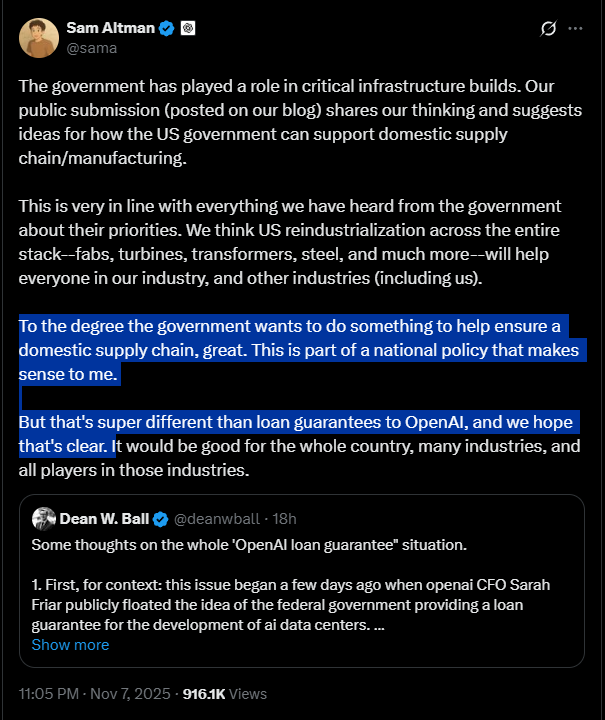OpenAI faces questions over calls for government support

Update from November 10, 2025:
Some on social media—including AI commentator Gary Marcus—have pointed out that OpenAI's recent letter to the White House appears to contradict CEO Sam Altman's claim that OpenAI is not seeking subsidies or government guarantees (see below).
The letter, published on October 27, 2025, before Altman's recent statements, openly calls for "grants, cost-sharing agreements, loans, or loan guarantees to expand industrial base capacity and resilience." It also pushes for broad industrial policy support, including tax credits for AI servers and data centers, streamlined permitting, and strategic reserves of critical raw materials.
Altman has pushed back on the criticism, saying the proposals are not about OpenAI specifically but are meant to support the entire AI sector. He argues this is not about bailouts or guarantees for OpenAI's own data centers. Instead, Altman says the government should act as a user or owner of its own infrastructure, while the market decides which companies succeed.

It seems clear that even sector-wide loans or guarantees would shift financial risk onto the public, with a dominant company like OpenAI poised to benefit the most. While this isn't a classic bailout, these requests land somewhere between "no subsidies" and targeted industrial policy.
Original article from November 6, 2025:
OpenAI CEO Sam Altman expects to hit $20 billion in annual revenue by year-end
OpenAI CEO Sam Altman says his company isn't asking for government guarantees or bailouts as it pours money into new data centers.
In a lengthy post on X, Altman made it clear that taxpayers shouldn't have to shoulder the risks of AI companies. If OpenAI makes a bad bet, he says, that's on them, not the public.
Instead, Altman wants the government to build its own AI infrastructure, like public data centers or a reserve of computing power, with all the benefits staying with public institutions. He says low-interest government loans could help fund these projects, but only if the payoff goes to the public.a das
The one exception is chips. OpenAI, like other tech companies, has joined federal efforts to boost American chip manufacturing, create jobs, and strengthen national security. But Altman says OpenAI hasn't asked for direct government guarantees, and any public funding should support the whole industry, not just one company.
OpenAI expects $20 billion in annual revenue by the end of the year
OpenAI plans to spend about $1.4 trillion over the next eight years. Altman says revenue should top $20 billion a year by the end of 2024, and could grow to "hundreds of billions" by 2030. Earlier projections put 2025 revenue at $13 billion, but Altman has already said the real numbers are "well more" than that. For comparison, OpenAI's 2023 revenue reportedly was $1.3 billion.
To hit these targets, OpenAI is expanding into enterprise tools, consumer devices, robotics, and selling access to computing power through its "AI Cloud."
Altman says OpenAI needs to invest at this scale to keep up with demand for computing power. He points out that the company is already holding back new features and models because capacity is limited, and he expects demand for AI to surge—especially in science and medicine—even though there's still no evidence that generative AI can deliver real scientific breakthroughs.
"Based on the trends we are seeing of how people are using AI and how much of it they would like to use, we believe the risk to OpenAI of not having enough computing power is more significant and more likely than the risk of having too much."
Sam Altman
Altman pushes back on the idea that OpenAI is indispensable or systemically important. If OpenAI collapses, he says, that's the free market in action—other players will fill the void. "But we of course could be wrong, and the market—not the government—will deal with it if we are."
The controversy over government intervention flared up after OpenAI CFO Sarah Friar was quoted discussing potential federal bailout money, a claim she promptly denied on LinkedIn. According to Altman, the whole episode was a misunderstanding and the real topic was public infrastructure, not a safety net for OpenAI. David Sacks, an AI advisor to Donald Trump, has also shot down the idea of state support if the "AI bubble" bursts.
AI News Without the Hype – Curated by Humans
As a THE DECODER subscriber, you get ad-free reading, our weekly AI newsletter, the exclusive "AI Radar" Frontier Report 6× per year, access to comments, and our complete archive.
Subscribe nowAI news without the hype
Curated by humans.
- Over 20 percent launch discount.
- Read without distractions – no Google ads.
- Access to comments and community discussions.
- Weekly AI newsletter.
- 6 times a year: “AI Radar” – deep dives on key AI topics.
- Up to 25 % off on KI Pro online events.
- Access to our full ten-year archive.
- Get the latest AI news from The Decoder.